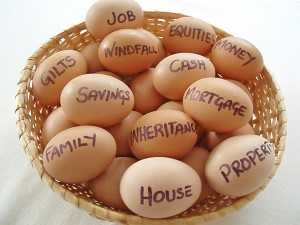 In these uncertain economic times, it is tempting to blame your financial situation on the economy, especially when the news continually floods the airways with negativity. Although media pundits and financial experts would like us to believe otherwise, you can’t control the overall economy, and contrary to popular opinion, neither can politicians. What you can control, however, is what I like to call your personal economy – that is, your own financial situation and its overall direction, health, and vitality.
In these uncertain economic times, it is tempting to blame your financial situation on the economy, especially when the news continually floods the airways with negativity. Although media pundits and financial experts would like us to believe otherwise, you can’t control the overall economy, and contrary to popular opinion, neither can politicians. What you can control, however, is what I like to call your personal economy – that is, your own financial situation and its overall direction, health, and vitality.
Controlling your own personal economy means no longer being at the mercy of the swings of the external economy, the rate of unemployment, or which party is in office. Let’s examine how you take back control of your own concerns.
Create Value
Money is simply one way to quantify value, and regardless of what the economy is doing, value is constantly being created. Therefore, there are always opportunities to create profit.
Examine the unique skills that you possess which provide value to your current company or business. Are there ways your skills can provide more, and thus create more income?
For example, my business once dipped because the buying habits of our customers changed. While it felt like the economy had dipped, the knowledge that I had gained in my business was still very valuable.
As my business readjusted, I did consulting for other businesses that were craving the knowledge I had. We now continue to offer consulting services as a secondary source of income, because the worth of doing so has been established. The most important part of your personal economy is the returns you can create for other people and your organization. If you increase the value of what you contribute, you increase your personal stock.
Be Marketable
Regardless of the state of the economy, there will always be who people spend money. You can be successful in any economic climate by finding where the money is being spent and stepping right into the stream of revenue. No matter what the stock market is doing or what the rate of unemployment is, companies will always need human capital, and customers are always buying something.
The media likes to declare that if the economy is doing poorly, the whole country must be poor. That’s not the case; believing this actually gives people an excuse to be unproductive. Instead, focus on enhancing your skills (and developing new ones!), networking, and coming up with new ideas that can benefit an employer – or your own entrepreneurial adventures.
Reputation is certainly a part of this; with social media and search engines, it’s becoming increasingly important. If there are negative reviews circulating about you, Google will find them. You can, however, flood the world with positive news about you. Press releases are a great way to do this. Furthermore, ensure that customers are cared for and encouraged to leave positive notes about you on online forums and boards.
One of the greatest hindrances to economic growth is resistance to change. The temptation for most people is to fight change and discourage it, when it is the very change that brings growth. A few decades ago, factory workers resisted the computer, but its invention has created more jobs and growth than the world has ever seen. Resisting these changes is like telling a car company it’s wrong for putting saddle makers out of business; the old manufacturers upgraded to make leather car seats. Instead of resisting change, embrace it and grow along with it.
Income Streams
A crucial part of a healthy personal economy is managing one’s finances. You’re your cash flowing by making money work for you. During times of boom, it’s tempting to spend more, buy bigger homes, and go on more vacations. When your income goes up, it gives you an opportunity to invest more. Dividend paying stocks, real estate, and income-producing websites are all mostly passive income streams that make your money work for you. When you have passive income from investments paying for your life, then you can increase your expenditures.
It’s common to see people taking advantage of a booming economy, only to be swamped in debt when things turn sour. Their response is to complain about the economy. Had they managed their personal finances, they could be sovereign over their future regardless of what the economy does. When you earn profits during good times, the money needs to be invested to create more money. One of the smartest things I ever did was create differentiated streams of income, apart from my business, so if anything ever happened, I would be fine. A strong foundation allows you to focus on other sources of revenue; you never worry about what the economy is going to do next.
When you focus on creating value, you no longer worry about job security, because it’s always there. When your finances are secure, there is peace of mind. And when you rely little on others, you have the freedom to create the life you desire.
Ryan Moran is an entrepreneur, writer, traveler, comedian, and overall cool dude. Ryan prides himself on inspiring, educating, and empowering people to have the freedom to live extraordinary lives. To discover the eight steps to controlling your personal economy, watch a free video series at www.FreedomFormula8.com. You can also discover more about Ryan at his personal blog, www.RyansReview.com.
This article originally appeared on Under30Finance




